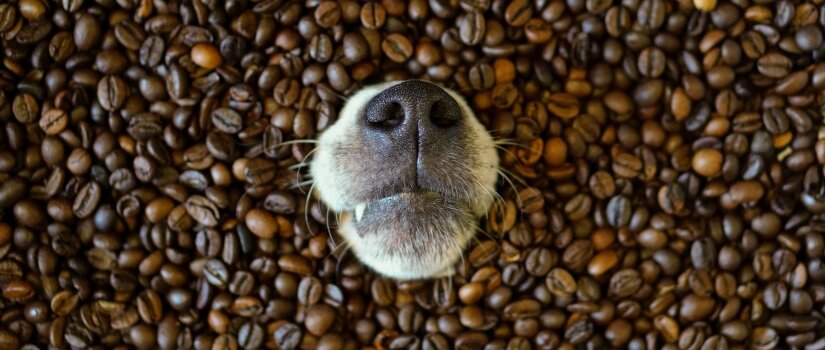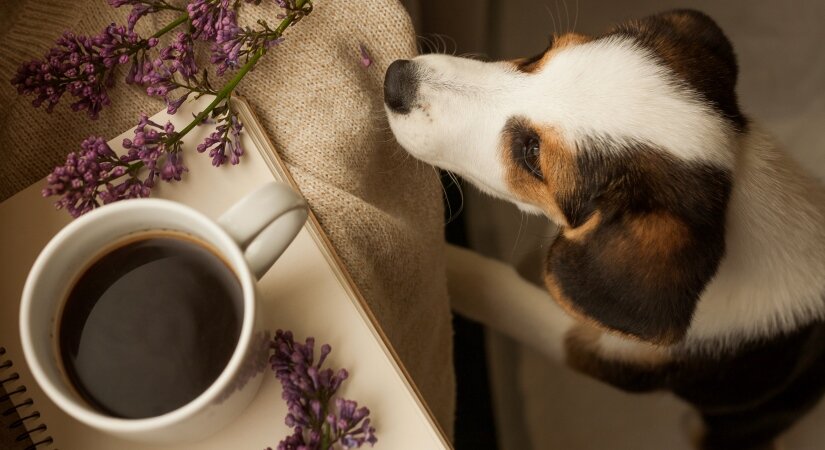We all enjoy our cup of coffee in the mornings. It jump-starts our day and gives us lots of energy. But can your dog enjoy coffee too? Coffee has Caffeine and is highly toxic to dogs. You should never share coffee with your dogs.
Now you may be asking if decaffeinated coffee is okay? No, dogs should not drink any coffee. They should only drink fresh water every day. Keep in mind that dogs should also not consume any products like ice-cream, pies, and yogurt containing Caffeine or chocolate.
Dogs should also not consume sodas and energy drinks that have Caffeine or may have coffee or chocolate flavoring. In this blog, we’ll discuss the dangers of Caffeine for dogs and why you should avoid caffeine toxicity at all costs.
VCA Animal Hospital adds that tea and soda, and diet pills, are full of Caffeine too. Many candy bars contain Caffeine, so you’ll need to keep them away from your furry best friend as well.
VCA says that “Caffeine also raises blood pressure and causes cardiac arrhythmias, which can be dangerous. Pets may also lose muscle control and have tremors or seizures. Caffeine affects the GI tract and causes vomiting, which can actually be a helpful side effect, since it removes some of the toxin from the body. They may also have diarrhea. Pets may urinate more just like we do after drinking a couple of sodas.”
All in all, pets are more sensitive to Caffeine than we are. Some pets may collapse and go into a coma after consuming Caffeine.
VCA explains that “Symptoms can start as soon as 30 minutes after ingestion and last for 12 or more miserable hours. Many caffeine-containing products also include other ingredients like sugars that can cause the pancreas’ inflammation to make matters worse. Pancreatitis is a severe medical condition that can be fatal.”
Dangers of Caffeine for Dogs

Caffeine stimulates the central nervous system and increases urine output. It causes a rapid heartbeat. There is individual sensitivity in dogs to Caffeine, with some dogs dying. After consuming Caffeine, dogs may show unusual thirst, vomit, have diarrhea, and start becoming restless.
Your dog then may show signs of hyperactivity, have tremors, and seizures with a lack of coordination. Dogs then start passing large amounts of urine and begin having a very rapid and irregular heartbeat.
A bluish tinge accompanies this to the skin and mucous membranes, fever, high blood pressure, and possibly your dog going into a coma. Your vet will increase fluids so that there is an increase in urine output with caffeine excretion in the urine. If your dog is not showing any of the signs yet after consuming coffee, your vet may begin inducing vomiting with repeated doses of activated charcoal. Symptoms of caffeine poisoning can continue for as long as 72 hours.
Is Coffee Bad for Dogs? 7 Symptoms of Caffeine Toxicity
If your dog suffers from caffeine poisoning, there’s no antidote. Your vet may induce vomiting and use medication to lower blood pressure if your dog has consumed a large amount of Caffeine.
Your vet may recommend anti-seizure pet meds. Your vet may keep your dog at the hospital while sedated for observation. Although your dog may not get sick from a small amount of Caffeine in a few sips of coffee, you should know these seven signs to watch for just in case.
- Hyperactivity: Caffeine can cause your dog to be more energized and restless.
- Elevated heart rate: Caffeine can increase your dog’s heart rate, cause abnormal heart rhythms, and make your dog pant more heavily.
- Hypothermia: Caffeine can raise your dog’s body temperature.
- Tremors and seizures: Caffeine can cause your dog to shake with tremors or even have an episode.
- Vomiting: Caffeine sensitivity can cause your dog to vomit.
- Collapse: Caffeine poisoning could cause your dog to collapse.
- Death: Caffeine poisoning may cause death if your dog consumes very high quantities of products with Caffeine, including coffee grounds, tea bags, diet pills, and drinks like coffee or soda.
Sources of Caffeine in Your Home

A hot cup of coffee, tea, or hot chocolate may not be the only source of dangerous Caffeine for your dog right in your home.
Here are additional sources of Caffeine in products you may have in your kitchen and bathroom.
- Coffee, coffee beans, and coffee grinds: Take care to dispose of your cup of coffee and your coffee grinds. Not only is coffee bad for dogs, but coffee grinds are equally toxic. Keep your trash container covered so your dog can’t get into trouble and eat poisonous products.
- Tea, soda & energy drinks: Keep these liquids away from your dog because they also may contain Caffeine. Make sure you dispose of your tea bags, so your dog doesn’t have any chance to find them and think they are fun to eat.
- Supplements, diet pills, and over the counter (OTC) pills: Caffeine is one ingredient in many supplements and medicines. Keep these bottles out of your dog’s reach.
- Theobromine: This chemical found in chocolate is similar to Caffeine. You may already know that chocolate is loaded with Caffeine and toxic to dogs. Now you know the answer is yes to the question, ‘is coffee bad for dogs?’
Note: Watch out for alternative names like these to keep toxic products that contain Caffeine away from your dog:
- Baker’s chocolate
- Milk chocolate
- White chocolate
- Cocoa powder
- Chocolate-covered espresso beans
- Halloween candy
- Cacao mulch
- Green tea
- No-Doz
- Methylxanthine
Ingestion of Caffeine and chocolate can be potentially life-threatening with heart rhythm abnormalities and central nervous system disturbances. It’s essential to keep in mind that many human foods are toxic to pets and that your pet will need emergency veterinary treatment if he’s consumed a hazardous food.
Remember that early intervention is key when it comes to any sort of poisoning. Reach out to your vet immediately if you suspect that your furry best friend has consumed coffee or a caffeinated product.
